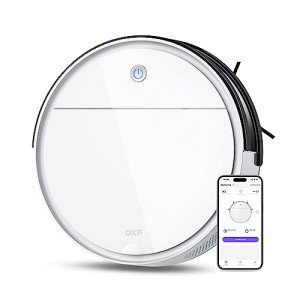10 Signs To Watch For To Look For A New Autonomous Vacuum
The Rise of Autonomous Vacuums: Revolutionizing Home Cleaning
In the age of innovation, home chores are ending up being significantly automated, and among the most noteworthy developments in this world is the autonomous vacuum. These smart cleaning robotics are designed to alleviate the drudgery of traditional vacuuming, making them popular amongst time-strapped families. This post checks out the development, performance, benefits, and constraints of autonomous vacuums, along with a contrast of a few of the leading models on the marketplace today.
What is an Autonomous Vacuum?
An autonomous vacuum, likewise called a robotic vacuum cleaner, is a small, automatic device that browses through your home to tidy floors without human intervention. Geared up with sensing units, video cameras, and advanced software, these vacuums can discover obstacles, prevent stairs, and optimize cleaning paths. They usually operate from a rechargeable battery, going back to their charging stations when their power is low or when cleaning tasks are completed.
Key Features of Autonomous Vacuums
Smart Navigation:
- Utilizes sensors and algorithms to map the environment.
- Can browse intricate designs and prevent challenges.
Scheduling:
- Allows users to set cleaning times.
- Can run when your home is empty, guaranteeing very little disruption.
Connection:
- Many models link to Wi-Fi, enabling app control and integration with smart home systems.
- Users can customize settings, check cleaning status, and get notifications through mobile applications.
Suction Power:
- Varies in between models; some deal adjustable suction settings for various floor types.
- High-end designs include effective suction capable of getting animal hair and deep dirt.
Floor Type Adaptability:
- Capable of cleaning carpets, hardwood, tiles, and more.
- Specific models specialize in tailored cleaning for numerous surface areas.
The Advantages of Using Autonomous Vacuums
1. Time-Saving
Among the most considerable advantages of autonomous vacuums is the amount of time they save. Instead of investing hours pressing a standard vacuum, house owners can set robotic vacuums to clean while they are engaged in other activities.
2. Consistent Cleaning Schedule
With the capability to set up cleanings, these vacuums make sure that spaces are frequently cleaned, resulting in a cleaner home in general. Regular cleaning helps preserve indoor air quality, specifically for families with allergies or asthma.
3. Smart Home Integration
Numerous autonomous vacuums can be integrated with clever home systems for seamless operation. House owners can control their vacuums by means of voice commands through devices like Amazon Alexa or Google Assistant, enhancing user benefit.
4. Compact Design
The slim profile of these gadgets enables them to clean under furnishings, such as couches and beds, where conventional vacuums often can not reach.
5. Pet-Friendly
For animal owners, autonomous vacuums can be a game-changer, as they are frequently equipped with specialized functions for choosing up animal hair and dander, contributing to a cleaner home environment.
Limitations of Autonomous Vacuums
Despite their lots of advantages, autonomous vacuums likewise have restrictions:
1. Restricted Deep Cleaning
While these vacuums effectively maintain tidiness, they may not change the efficiency of a deep clean provided by conventional vacuums, particularly for greatly stained locations.
2. Capability Constraints
Many autonomous vacuums come with little dust bins that require to be cleared frequently, especially in bigger homes or homes with family pets. automatic hoover can be an inconvenience for some users.
3. Navigation Challenges
Although navigation innovation is continually improving, some designs might deal with particular layouts, especially complex spaces with many challenges or really little spaces.
4. Rate Point
While costs have ended up being more accessible, high-end designs can still be quite pricey, posing a barrier for some customers.
Comparison of Top Autonomous Vacuum Models
Model
Smart Features
Battery Life
Suction Strength
Rate Range
iRobot Roomba 980
App Control, Voice Assistant
120 minutes
1700 Pa
₤ 700 – ₤ 900
Roborock S6 MaxV
Advanced Mapping, Connectable
180 minutes
2500 Pa
₤ 600 – ₤ 800
Ecovacs Deebot Ozmo
Mopping, Smart Home
110 minutes
1500 Pa
₤ 450 – ₤ 700
Neato Botvac D7
Laser Navigation, Custom Zones
120 minutes
2000 Pa
₤ 800 – ₤ 900
Shark IQ Robot
Self-Emptying Base, Smart Map
90 minutes
1500 Pa
₤ 400 – ₤ 600
Notable Takeaways
- Smart Features: Consumers must prioritize models offering robust clever features for convenience and efficiency.
- Battery Life: A longer battery life is beneficial for larger living spaces.
- Suction Strength: Depending on home requirements, varying suction power can significantly impact cleaning effectiveness.
FAQs about Autonomous Vacuums
Q1: How do I maintain my autonomous vacuum?
A: Regular maintenance consists of cleaning the brushes, clearing the dustbin, and looking for obstructions. In addition, keeping the sensing units clean up will assist preserve navigation precision.
Q2: Can robotic vacuums clean rugs and carpets?
A: Yes, many robotic vacuums are designed to efficiently clean both difficult surface areas and carpets. Nevertheless, suction power may vary based on the design.
Q3: Do robotic vacuums require Wi-Fi?
A: While many autonomous vacuums gain from Wi-Fi connectivity for app control and updates, some models can run independently without a wireless connection.
Q4: How typically should I run my robotic vacuum?
A: It depends upon your living situation, however running it numerous times a week is typically recommended, specifically for homes with family pets.
In conclusion, autonomous vacuums represent a significant advancement in home cleaning innovation, appealing benefit and effectiveness. While these gizmos may not entirely replace conventional vacuum cleaners, they are unquestionably practical in maintaining a tidy living environment. As innovation continues to develop, the future of home cleaning looks promising, and these gadgets are at the leading edge of the transformation.
